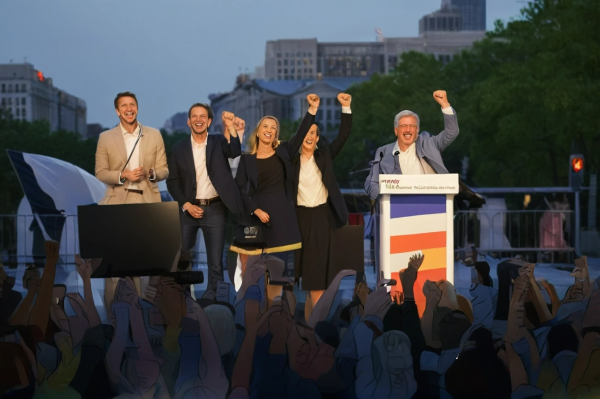Iran’s Plan to Strike Back Against the U.S.
Iran’s Military Preparations Following U.S. Attacks
Loading...

A loose alliance of left-wing parties has emerged as the largest bloc in parliament, resulting in a hung parliament after the recent vote.
A loose coalition of left-wing parties has secured the most seats in France’s crucial legislative elections, outpacing both the far right and President Emmanuel Macron’s centrist coalition.
Despite their success, no party achieved an outright majority in the 577-seat National Assembly following Sunday’s run-off vote, leaving France in political uncertainty just days before a major NATO summit and three weeks before the Paris Olympic Games.
Prime Minister Gabriel Attal announced plans to offer his resignation to Macron on Monday but expressed his willingness to continue in his role “as long as duty demands,” especially with the Paris Games approaching.
“Our country is facing an unprecedented political situation and is preparing to welcome the world in a few weeks,” Attal stated.
The New Popular Front (NFP) – a recent alliance combining the Socialists, Greens, Communists, and the hard-left France Unbowed – won 177 seats. Macron’s Ensemble coalition secured 148 seats, while Marine Le Pen’s National Rally (RN) obtained 142 seats.
Although the results represent a significant achievement for the far right, they fell short of the National Rally's expectations of becoming the largest party after Macron called for the snap election to counter France’s political polarization.
Supporters of the left-wing alliance celebrated their victory in Republic Square, central Paris, with festivities including flares, drumbeats, and chants of “We’ve won! We’ve won!”
Jean-Luc Mélenchon, the outspoken leader of France Unbowed and the NFP coalition, asserted that the left should be given the opportunity to form the government. “The united left has proven itself equal to the historic moment, thwarting the trap set for the country and, in its own way, saving the republic once again,” he declared.
In the initial round of elections on June 30, the National Rally had led, and opinion polls suggested they might emerge as the largest party in the final vote.
Late on Sunday, Macron’s office acknowledged the election outcome, stating, “The President will ensure that the sovereign choice of the French people is respected.”
Marine Le Pen, hinting at a potential fourth presidential run in 2027, remarked that the results set the stage for “the victory of tomorrow.” She added, “The tide is rising. It did not rise high enough this time, but it continues to rise, and thus, our victory has only been delayed.”
Reporting from Paris, a journalist noted the shock among people as the exit poll results were announced. “This is a huge blow for those at the RN headquarters. Le Pen has long aspired to be the president of France… She has been defeated again,” they said.
The brief campaign, the shortest in French history, was marred by threats, violence, and racist abuse directed at numerous candidates and campaigners. About 30,000 police officers were deployed to maintain order, and there were concerns about potential unrest in some cities following the results.
Despite these tensions, voter turnout was robust. By 5 p.m. (15:00 GMT), 61.4 percent of voters had cast their ballots, marking the highest turnout at this stage of a legislative race since 1981, according to the Ministry of the Interior.
Rim-Sarah Alouane, a researcher at the University Toulouse-Capitole, commented on the outcome, stating that France “avoided the worst tonight, that’s for sure.” She added, “There was a significant vote from people who recognized the danger posed by the far right coming to power. But it’s concerning that we were in that situation to begin with.”
Iran’s Military Preparations Following U.S. Attacks
Troops remain in five strategic locations, raising fears of renewed tensions and long-term occupation.
Opposition forces have taken control of the capital after a significant offensive. Here is how it unravelled.
